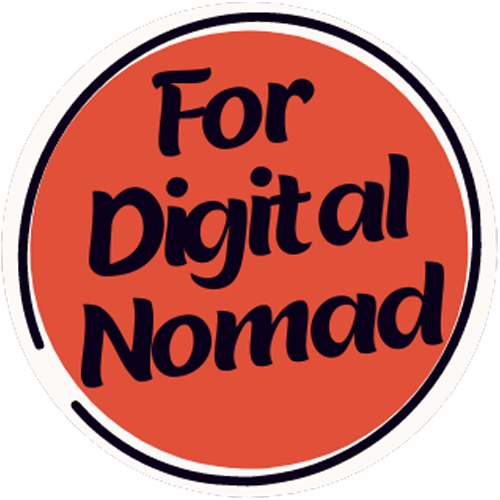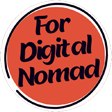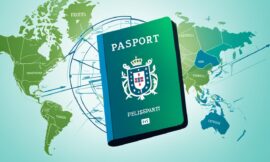Welcome to our comprehensive guide on long-term digital nomad visas! If you’re a remote worker with a desire to explore new countries and work from anywhere in the world, or an employer looking to embrace global mobility programs, this guide is for you. We’ll cover everything you need to know, from eligibility criteria and application processes to costs, visa renewal options, and beyond. By the end, you’ll be equipped with the knowledge to live sustainably and work remotely from your dream destinations.
Are you ready to embark on a journey of flexibility, freedom, and adventure? Let’s dive in and discover the world of long-term digital nomad visas!

Table of Contents
Key Takeaways:
- Long-term digital nomad visas enable remote workers to travel and work from different countries.
- Global mobility programs offer flexible visa arrangements for employers and employees.
- Eligibility criteria, application processes, and necessary documents vary by country.
- Understanding the costs and tax implications is crucial when considering long-term visa options.
- Potential careers for digital nomads range from freelancing to entrepreneurial ventures.
Understanding Long-Term Digital Nomad Visas
In this section, we will provide an overview of long-term digital nomad visas. Let’s start by defining what it means to be a digital nomad and explore the various types of visas applicable to this lifestyle.
Defining a Digital Nomad and Applicable Visas
A digital nomad is an individual who leverages remote work opportunities to travel and work from different locations around the world. These individuals typically rely on technology to perform their job duties, allowing them the freedom to choose their work environment and explore new destinations.
For digital nomads, having the right visa is crucial to ensure legal entry and stay in a foreign country. While tourist visas often have limited validity and don’t permit individuals to engage in work activities, there are specific visas designed to cater to the needs of digital nomads.
Applicable visas for digital nomads vary across countries and jurisdictions. Some popular visa options include:
- Temporary Residence Visas: These visas allow digital nomads to legally reside in a country for an extended period and engage in freelance work, remote employment, or entrepreneurship. Countries like Estonia, Germany, and Portugal offer such programs.
- Remote Work Visas: These visas specifically target remote workers and offer long-term stay options. Countries like Barbados, Bermuda, and the Cayman Islands have introduced remote work visa programs to attract digital nomads.
- Digital Nomad Visas: Some countries have recently introduced digital nomad-specific visas that cater to the unique needs of remote workers. Examples include Dubai’s Virtual Working Program and Croatia’s Digital Nomad Visa.
By understanding the various visa options for digital nomads, individuals can choose the best fit for their desired destination and work arrangement.
Legalities and Benefits of Digital Nomad Visas
Acquiring a digital nomad visa brings several legal benefits, granting individuals the opportunity to work and live in foreign countries without violating immigration laws. These visas provide greater stability and peace of mind, offering legal protection while pursuing a nomadic lifestyle.
One of the key advantages of digital nomad visas is the ability to work remotely while exploring new destinations. This flexibility allows individuals to experience different cultures, meet new people, and enhance their global perspectives while maintaining a sustainable lifestyle.
Furthermore, digital nomad visas often provide access to essential services and benefits, such as healthcare, social security, and educational opportunities for families. These visas prioritize the well-being and integration of digital nomads into local communities.
Countries Offering Visas for Long-Term Stay
Several countries around the world recognize the value and contributions of digital nomads and have launched dedicated programs to attract this growing segment of workers.
Some of the countries offering long-term stay visas for digital nomads include:
| Country | Visa Program |
|---|---|
| Estonia | Digital Nomad Visa |
| Germany | Freelancer Visa |
| Portugal | Digital Nomad Visa |
| Barbados | Barbados Welcome Stamp |
| Bermuda | Work from Bermuda Certificate |
| Cayman Islands | Global Citizen Certificate |
| Dubai | Virtual Working Program |
| Croatia | Digital Nomad Visa |
These countries recognize the potential economic and cultural benefits of attracting digital nomads and have implemented visa programs to facilitate their entry and stay.
Now that we understand the concept of long-term digital nomad visas, we can delve deeper into the eligibility criteria and application process in the following sections.
The Eligibility Criteria for Digital Nomad Visas with Long Validity
In order to apply for digital nomad visas with long validity, it is important to meet certain eligibility criteria. These criteria may vary depending on the country you wish to apply to, but there are some common requirements to consider. Let’s take a closer look at the key factors that determine your eligibility for a long-term digital nomad visa.
Age Requirements
Age is an important factor when it comes to digital nomad visa eligibility. While there is no set age limit, most countries expect applicants to be at least 18 years old. Some countries may have specific age restrictions, such as requiring applicants to be under a certain age, typically 35 or 40, to be eligible for their digital nomad visa programs. It is important to research the age requirements of the country you are interested in to ensure you meet their criteria.
Monthly Income Thresholds
One of the main eligibility criteria for digital nomad visas is meeting specific income thresholds. Most countries require applicants to have a stable source of income that allows them to support themselves while residing in the country. In some cases, this income must be earned from a job or business outside of the country. The monthly income thresholds can vary greatly from country to country, so it’s essential to review the specific requirements of your chosen destination.
Types of Jobs or Businesses
Another crucial eligibility factor is the type of job or business you have. Some countries may only accept applicants who work in specific industries or have occupations that align with their economic development goals. For example, countries may prioritize individuals in the tech industry, entrepreneurs, or freelance professionals. It is essential to research the types of jobs or businesses that qualify for a digital nomad visa in your desired country to ensure your occupation meets their criteria.

| Eligibility Criteria | Requirements |
|---|---|
| Age | 18 years or older |
| Monthly Income | Meets country-specific thresholds |
| Job or Business | Qualifies under country-specific guidelines |
Comprehensive Application Process for Remote Work Permits
Step-by-Step Guide on Filling Out Your Application
Applying for a remote work permit can seem daunting, but with this step-by-step guide, you’ll have a clear understanding of the entire process. Follow these instructions to ensure a smooth and successful application:
- Gather all necessary documentation, such as proof of employment, valid passport, and any required certifications or qualifications.
- Review the application form carefully, ensuring that you fill out all sections accurately and completely.
- Double-check the application for any errors or missing information. It’s important to provide all required details to avoid delays or rejection.
- Include any additional supporting documents requested, such as a cover letter, resume, or reference letters. These documents can strengthen your application.
- Submit the completed application form and supporting documents to the designated authority either online or through a physical submission.
- Pay the applicable fees as outlined in the application guidelines. Keep a copy of the payment receipt for your records.
- Track the progress of your application and stay updated on any communication from the authorities. This may include requests for further information or an invitation for an interview.
- Respond promptly to any requests for additional information or attend scheduled interviews as required.
- Wait for the processing of your application. The timeframe can vary depending on the country and the volume of applications received.
- Once your application is approved, follow any instructions provided to collect your remote work permit.
Scheduling Appointments and Interviews
Scheduling appointments and attending interviews are essential steps in the application process for remote work permits. Here’s what you need to know:
- Check the application guidelines to determine if scheduling appointments or interviews are required.
- If appointments or interviews are necessary, follow the instructions provided to schedule them. This may involve contacting the relevant authorities or using an online appointment system.
- Make sure to arrive on time for your scheduled appointment or interview. Prepare any additional documents or information that may be requested during this stage.
- Dress professionally and present yourself in a courteous and professional manner during the interview. Be prepared to answer questions related to your work and the purpose of your application.
- Take notes during the appointment or interview to ensure that you have all the necessary information for further steps in the application process.
Preparing the Necessary Documentation
Preparing the necessary documentation is crucial to a successful application. Here are some key documents you may need to include:
- Passport: Provide a copy of your valid passport, including all relevant pages.
- Proof of Employment: Include a letter from your employer stating your position, job responsibilities, and confirmation of remote work.
- Proof of Income: Submit documents that demonstrate your financial stability, such as bank statements, tax returns, or pay stubs.
- Educational Certificates: If your profession requires specific qualifications, include copies of your educational certificates or diplomas.
- Professional Certifications: If applicable, provide copies of any professional certifications or licenses related to your field of work.
- Background Checks: Some countries may require you to provide a police clearance certificate or other background checks.
Remember to double-check the specific requirements outlined by the authorities in the country where you are applying for a remote work permit. Providing accurate and complete documentation will increase your chances of a successful application.
Essential Documents for Securing Extended Stay Visas
When applying for extended stay visas, it’s crucial to have all the essential documents in order. These documents play a vital role in proving your eligibility and ensuring a smooth visa application process. In this section, we will explore the necessary documents, including document verification and authentication processes, as well as the health insurance and financial proof requirements you need to fulfill.
Document Verification and Authentication
Document verification and authentication are critical steps in obtaining an extended stay visa. These processes ensure the legitimacy and accuracy of your submitted documents. Most countries have specific procedures for document verification, which may involve submitting original or certified copies of essential documents such as passports, birth certificates, marriage certificates, educational qualifications, and employment records. It’s important to thoroughly review the requirements and guidelines provided by the immigration authorities to ensure compliance.

Health Insurance and Financial Proof Requirements
Health insurance and financial proof are significant considerations for securing an extended stay visa. Adequate health insurance coverage is often mandatory to cover any potential medical expenses during your stay in the host country. The immigration authorities may require proof of a valid health insurance policy with specific coverage limits and benefits. It’s essential to research and select a suitable health insurance plan that meets the requirements of the visa application.
In addition to health insurance, you may also need to provide financial proof to demonstrate that you can financially support yourself during your extended stay. This typically includes providing bank statements, proof of employment or income, and other supporting documentation to substantiate your financial stability. The specific financial proof requirements may vary depending on the country and the length of your stay. Make sure to carefully review the guidelines and fulfill the financial proof requirements outlined by the immigration authorities.
By ensuring the proper verification and authentication of your documents and meeting the health insurance and financial proof requirements, you can strengthen your visa application and increase the chances of obtaining an extended stay visa. It is essential to gather and organize all the necessary documents well in advance to avoid any delays or complications during the application process.
Understanding the Costs of Global Mobility Programs
When considering global mobility programs, it’s important to understand the associated costs. While the allure of working and living in different countries is undoubtedly exciting, it’s essential to plan your finances to ensure a smooth and enjoyable experience. Let’s take a closer look at the various expenses you may incur during your global mobility journey:
- Visa Application Fees: One of the primary costs of participating in a global mobility program is the visa application fee. These fees can vary significantly depending on the country and the type of visa you’re applying for. It’s crucial to research the specific visa requirements and associated costs beforehand to avoid any surprises.
- Health Insurance Premiums: Another important cost to consider is health insurance premiums. As a global traveler, it’s essential to have comprehensive health insurance coverage that can protect you in case of any unforeseen medical emergencies. The cost of health insurance can vary depending on factors such as your age, pre-existing conditions, and the level of coverage you require.
- Travel and Accommodation Costs: Participating in a global mobility program often involves frequent travel and potential relocation. These costs can include flights, accommodation, transportation, and daily expenses. It’s important to budget for these costs and consider factors such as destination popularity, seasonality, and the duration of your stay.
- Additional Financial Considerations: Apart from the aforementioned costs, there may be other financial considerations to keep in mind. These can include taxes, currency exchange fees, living expenses in the host country, and potential costs associated with visa renewals or extensions. It’s advisable to consult with a financial advisor to understand the specific financial implications of participating in a global mobility program.
By carefully considering the costs of global mobility programs, you can effectively plan your budget and ensure that you have the financial resources to support your journey. Remember, it’s essential to balance your budget while still allowing yourself to fully embrace the incredible opportunities that global mobility programs offer.
| Expenses | Description |
|---|---|
| Visa Application Fees | The cost of applying for a global mobility program visa varies by country and visa type. |
| Health Insurance Premiums | Comprehensive health insurance coverage is crucial when participating in a global mobility program. |
| Travel and Accommodation Costs | Frequent travel and potential relocation expenses, including flights, accommodation, transportation, and daily expenses. |
| Additional Financial Considerations | Taxes, currency exchange fees, living expenses, and potential costs associated with visa renewals or extensions. |
Navigating Visa Renewal and Extension Options
Once you have obtained your digital nomad visa and enjoyed the freedom of working remotely from your chosen destination, you may find yourself wanting to extend your stay. Navigating the visa renewal and extension process can seem daunting, but it doesn’t have to be. In this section, we’ll guide you through the criteria for visa extension eligibility and provide a step-by-step process for renewing your digital nomad visa, ensuring that you can continue your stay and work in the host country.
Criteria for Visa Extension Eligibility
Before you start the renewal process, it’s important to understand the criteria for visa extension eligibility. Each country’s immigration policies may vary, but common factors that are often considered include:
- Continued remote work or business activity
- Proof of financial stability
- No criminal record
- Proof of health insurance coverage
- Compliance with local tax regulations
These criteria ensure that you are adhering to the requirements set by the host country to continue your stay as a digital nomad. It’s essential to review and understand the specific eligibility criteria for visa extension in the country where you are residing.
Process for Renewing Your Digital Nomad Visa
Renewing your digital nomad visa typically involves an application process similar to the initial visa application. The specific steps may vary depending on the host country, but here is a general overview of the process:
- Gather the necessary documents: This may include your passport, current visa, proof of income, health insurance, and any other supporting documentation required by the immigration authorities.
- Complete the application form: Fill out the renewal application form accurately and truthfully. Pay attention to any additional questions or requirements specific to visa extensions.
- Submit your application: Submit your completed application form along with the required supporting documents and any applicable fees to the appropriate immigration office or embassy.
- Attend any required interviews: In some cases, you may be required to attend an interview as part of the renewal process. Be prepared to answer questions about your ongoing remote work or business activities and provide any additional information requested.
- Wait for the decision: After submitting your application, you will need to wait for the immigration authorities to review and process your renewal request. This can take anywhere from a few weeks to several months, depending on the country and workload of the immigration office.
- Receive your renewed visa: If your renewal application is approved, you will receive your renewed digital nomad visa, allowing you to continue your stay and work in the host country.
It’s important to start the renewal process well in advance of your current visa’s expiration date to avoid any issues or gaps in your legal status. Stay organized, follow the instructions provided by the immigration authorities, and ensure that you submit all required documents for a smooth renewal process.
Renewing your digital nomad visa can be a straightforward process when you understand the criteria for extension eligibility and follow the necessary steps. By renewing your visa, you can continue to live the digital nomad lifestyle and explore new destinations while enjoying the benefits of remote work.

Comparison: Digital Nomad Visas vs Tourist Visas
In this section, we will compare digital nomad visas and tourist visas, shedding light on the key differences between the two in terms of duration, limitations, work eligibility, and length of stay. By understanding the pros and cons of each visa type, you will be able to make a well-informed decision regarding which option is best suited to your needs as a long-term digital nomad.
The Duration and Limitations of Each Visa Type
One of the primary considerations when choosing between a digital nomad visa and a tourist visa is the duration of your stay. While tourist visas typically have a limited validity of a few months, digital nomad visas often offer longer-term arrangements, ranging from several months to several years. This extended duration provides you with the opportunity to fully immerse yourself in the local culture, establish a routine, and develop deeper connections within the community.
Additionally, it’s important to consider the limitations imposed by each visa type. Tourist visas often come with strict restrictions on work eligibility, prohibiting you from engaging in any form of employment or earning income while visiting the country. On the other hand, digital nomad visas are specifically designed to accommodate remote work and provide you with the necessary work permits, allowing you to legally work and generate income while enjoying your time abroad.
Comparing Benefits: Work Eligibility and Length of Stay
When comparing digital nomad visas and tourist visas, it is essential to evaluate the benefits offered by each in terms of work eligibility and length of stay. Tourist visas typically prioritize leisure and travel activities, allowing you to explore the country as a visitor. However, they often come with restrictions on employment, limiting your ability to work during your stay.
In contrast, digital nomad visas prioritize remote work and provide you with the flexibility to earn an income while traveling. These visas offer work eligibility, allowing you to engage in employment, start and run a business, or work as a freelancer in the host country. This enables you to fully embrace the digital nomad lifestyle, working from anywhere in the world as long as you have an internet connection.
Furthermore, digital nomad visas often provide longer lengths of stay compared to tourist visas. This extended duration allows you to establish a more stable and sustainable lifestyle as a digital nomad, avoiding the need for frequent visa renewals and providing a sense of security and continuity in your chosen destination.
Comparison of Digital Nomad Visas and Tourist Visas
| Aspect | Digital Nomad Visas | Tourist Visas |
|---|---|---|
| Duration | Extended (several months to years) | Limited (few months) |
| Limitations | Work eligibility, income generation | Work restrictions |
| Benefits | Remote work, flexibility, income generation | Leisure, travel, exploration |
| Length of Stay | Longer-term | Short-term |
This table provides a quick overview and comparison between digital nomad visas and tourist visas, highlighting the differences in key aspects. It can assist you in making an informed decision based on your specific needs and preferences as a long-term digital nomad.
Sustainable Visa Solutions: Including Family Members
When it comes to long-term digital nomad visas, sustainable visa solutions that allow for the inclusion of family members are essential for many individuals and their loved ones. Applying for a visa as a family unit ensures that everyone can enjoy the benefits of living and working abroad together.
Applying for a Visa as a Family Unit
Applying for a visa as a family unit involves a slightly different process compared to applying as an individual. It’s important to carefully review the specific requirements and documentation needed for each family member. This may include proof of relationships, such as marriage certificates or birth certificates, and additional financial proof to support the entire family’s stay in the host country.
It’s also crucial to consider the eligibility criteria for each family member, as different countries may have specific age requirements or income thresholds. Understanding and fulfilling these criteria will increase the chances of a successful visa application for the entire family.
Understanding the Implications for Dependents
When applying for a long-term digital nomad visa as a family unit, it’s important to consider the implications and benefits for dependents. Dependents, such as spouses and children, may have different visa conditions and timelines compared to the primary visa holder.
Some countries offer dependent visas that allow spouses and children to live and study in the host country while the primary visa holder works remotely. These dependent visas may have separate renewal processes and conditions, so it’s crucial to stay informed and comply with the relevant regulations.
Additionally, considering the implications for dependents includes addressing their educational needs and healthcare coverage in the host country. Researching schooling options and healthcare systems beforehand will help ensure a smooth transition for the entire family and provide peace of mind while pursuing a long-term digital nomad lifestyle.

By including family members in your long-term digital nomad journey, you can create lifelong memories and enrich your experience of exploring different cultures together. Navigating the visa application process as a family unit and understanding the implications for dependents are crucial steps in ensuring a successful and harmonious transition to a new country.
Tax Implications of Long-Term Visa Options
When it comes to long-term visa options for digital nomads, understanding the tax implications is crucial. You may have tax obligations in both your home country and the host country. However, there are also potential tax exemptions and benefits that you can take advantage of.
Managing your finances effectively and complying with tax regulations is essential to ensure a smooth and hassle-free experience as a digital nomad. By staying informed about the tax implications of your long-term visa options, you can make informed decisions and plan your financial strategies accordingly.
“Taxes are like dark clouds in the sky; you can’t avoid them, but you can find a way to dance in the rain.”
Whether you’re earning income from clients or businesses in different countries or receiving passive income through investments, it’s important to understand the tax laws and regulations in each jurisdiction. Consulting with a tax professional who specializes in international taxation can provide valuable insights and guidance to ensure compliance and optimize your tax planning.
| Tax Considerations | Home Country | Host Country |
|---|---|---|
| Tax Residency | Depending on your home country’s tax laws, you may need to maintain tax residency or meet certain criteria to remain a tax resident. This can have implications for your tax obligations. | As a digital nomad, you may become a tax resident in the host country. Understanding the tax residency rules and requirements is essential to manage your tax affairs. |
| Double Taxation | Your home country and the host country may have a tax treaty in place to prevent double taxation. This can help you avoid paying tax on the same income twice. | However, if there is no tax treaty, you may need to navigate the complexities of dual taxation. Seeking professional advice can help you minimize the impact of double taxation. |
| Tax Exemptions and Deductions | Depending on your situation and the tax laws of your home country, you may be eligible for various tax exemptions and deductions. These can help reduce your tax liability. | Similarly, the host country may offer tax incentives and deductions for digital nomads. Researching the tax laws and regulations is essential to take advantage of these benefits. |
| Record-Keeping | Keeping detailed records of your income, expenses, and tax-related documents is crucial for accurate reporting and compliance with tax obligations in your home country. | Similarly, maintaining proper records of your income and expenses in the host country can simplify tax filing and facilitate any necessary audits or inquiries. |
Staying up to date with tax regulations and seeking professional advice can help you navigate the complexities of tax implications as a long-term digital nomad. By proactively managing your tax obligations, you can focus on enjoying the freedom and flexibility of working and living from anywhere in the world.
Potential Careers and Job Types for Long-Term Digital Nomads
When it comes to long-term digital nomad visas, the opportunities for potential careers and job types are vast. Whether you are a freelancer, entrepreneur, or employee, there are various avenues to explore. Remote work visas open up a whole new world of possibilities, allowing you to work from anywhere while embracing the digital nomad lifestyle. Let’s take a look at the types of work that are well-suited for remote work visas and the most in-demand skills for digital nomads.
Types of Work Suited for Remote Work Visas
One of the key advantages of remote work visas is the flexibility it offers in terms of job choices. Here are some of the types of work that are particularly suited for long-term digital nomads:
- Freelancing: Remote work visas enable freelancers to take their work on the road. Whether you’re a writer, designer, programmer, or marketer, you can offer your services remotely and attract clients from around the world.
- Online Entrepreneurship: With a remote work visa, you can pursue your entrepreneurial dreams while travelling. Start an e-commerce store, launch a digital marketing agency, or create an online course. The possibilities are endless.
- Remote Employment: Many companies now offer remote work opportunities. From customer service and content writing to software development and project management, remote employment allows you to work for a company while enjoying the freedom to travel.
- Consulting: If you have expertise in a specific field, remote work visas allow you to offer consulting services remotely. Become a business consultant, marketing consultant, or financial advisor, and provide your insights and guidance to clients worldwide.
- Digital Services: Remote work visas open up possibilities in the digital services sector. Become a social media manager, SEO specialist, virtual assistant, or graphic designer, and offer your skills to clients from anywhere in the world.
The Most In-Demand Skills for Digital Nomads
As the digital nomad lifestyle continues to gain popularity, certain skills are in high demand. If you want to thrive as a long-term digital nomad, consider developing these sought-after skills:
- Digital Marketing: With the increasing importance of online presence, digital marketing skills are in high demand. This includes areas such as social media marketing, search engine optimization (SEO), content marketing, and email marketing.
- Web Development: In an increasingly digital world, web development skills are essential. Knowledge of front-end and back-end development, as well as proficiency in coding languages such as HTML, CSS, and JavaScript, can open up numerous opportunities.
- Language Skills: Being fluent in multiple languages can be highly advantageous for digital nomads. It allows you to work with clients from different countries and enhances your ability to connect and communicate effectively.
- Project Management: Remote work often requires individuals who can effectively manage projects and teams. Developing strong project management skills, including organization, communication, and leadership, can make you an invaluable asset.
- Creativity: Creativity is highly valued in the digital world. Whether it’s graphic design, content creation, or video production, showcasing your creative skills can set you apart and attract clients looking for unique and engaging content.
By focusing on these in-demand skills and exploring the job types suited for remote work visas, you can discover exciting career opportunities as a long-term digital nomad.
Conclusion
As we come to the end of this comprehensive guide on long-term digital nomad visas, we hope you have gained valuable insights into the world of remote work and global mobility.
Throughout this guide, we have discussed the eligibility criteria, application process, necessary documentation, costs, visa renewal and extension options, and the comparison between digital nomad visas and tourist visas. By understanding these key aspects, you are now equipped with the knowledge to embark on your journey as a long-term digital nomad.
Remember, long-term digital nomad visas offer incredible opportunities and flexibility. They allow you to live and work from anywhere in the world, experiencing new cultures, building global connections, and expanding your horizons. So why wait? Start exploring the possibilities today and unlock a lifestyle that combines work and travel like never before.
If you have any further questions or need assistance in navigating the world of long-term digital nomad visas, feel free to refer to the resources provided below. Good luck on your digital nomad adventure!
FAQ
What is a digital nomad?
A digital nomad is someone who uses technology to work remotely and has the flexibility to travel and live in different locations while earning an income.
What types of visas are applicable to digital nomads?
Digital nomads can apply for long-term digital nomad visas, remote work permits, extended stay visas, or participate in global mobility programs.
What are the legalities and benefits of digital nomad visas?
Digital nomad visas offer the freedom to work remotely while traveling and living in various locations, providing flexibility and a unique lifestyle experience.
Which countries offer visas specifically designed for long-term stays for digital nomads?
Some countries that offer digital nomad visas include Estonia, Barbados, Croatia, and Bermuda, among others.
What are the eligibility criteria for digital nomad visas with long validity?
The eligibility criteria may include age requirements, minimum monthly income thresholds, and qualifying jobs or businesses.
What is the application process for remote work permits?
The application process typically involves filling out an application, scheduling appointments or interviews, and submitting the necessary documentation.
What essential documents do I need for securing extended stay visas?
You may need to provide documents for verification and authentication, as well as proof of health insurance coverage and financial means to support your stay.
What are the costs associated with global mobility programs?
The costs may include visa application fees, health insurance premiums, travel, accommodation, and other financial considerations.
How can I renew or extend my digital nomad visa?
To renew or extend your digital nomad visa, you’ll need to meet specific criteria and follow the relevant process outlined by the host country.
What are the differences between digital nomad visas and tourist visas?
Digital nomad visas typically offer longer durations, work eligibility, and flexibility compared to tourist visas, which are generally intended for shorter stays and limited work activities.
Can I include family members in sustainable visa solutions?
Yes, you can include family members in your visa application as a family unit, subject to additional requirements and considerations.
What are the tax implications of long-term visa options?
Long-term visa options may have tax implications in both your home country and the host country, and it’s essential to understand your tax obligations and any potential benefits or exemptions.
What potential careers and job types are suitable for long-term digital nomads?
Freelancers, entrepreneurs, and employees in various fields, such as digital marketing, programming, writing, and graphic design, can find suitable job opportunities as long-term digital nomads.









